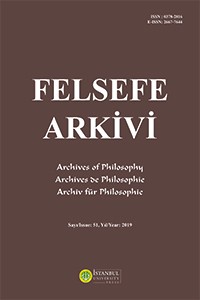Öz
Having drawn the distinction between logic as a discipline and logic as organon, this short paper focuses on the latter, the purpose of which is twofold. First, it highlights the importance of second-order logic and modal logic in ontology. To this aim, the role of second-order logic is illustrated in formalizing realist ontology committing to the existence of properties. It is also emphasized how quantified modal logic helps clarify de re/de dicto distinction that implicitly takes place in ordinary language. Secondly, the paper concentrates on the significance of modal logic in the philosophy of language. In pursuing this goal, we considered Kripke’s notions of rigid designator, necessary a posteriori and contingent a priori statements. Given the definition of rigid designator, it is possible to prove in quantified modal logic that an identity between proper names, like “Hesperus” and “Phosphorus”, if true, is necessarily true. But the truth of the identity statement “Hesperus = Phosphorus” is known a posteriori. Therefore, there are necessary a posteriori truths. There are also contingent a priori true statements like “The length of stick S at time t0 = one meter”, as there exists a possible world in which this statement is false.
Anahtar Kelimeler
Second-order logic quantified modal logic possible-worlds semantics necessary a posteriori contingent a priori
Kaynakça
- Chihara, C. S. (1998). The Worlds of Possibility: Modal Realism and the Semantics of Modal Logic. Oxford: Oxford University Press.
- Frege, G. (1892/1997). “On Sinn and Bedeutung” in M. Beaney, ed., The Frege Reader, pp. 151 – 171. Oxford: Blackwell.
- Kripke, S. A. (1972/1980). Naming and Necessity. Cambridge, MA: Harvard University Press.
- Zalta, E. N. (1983). Abstract Objects: An Introduction to Axiomatic Metaphysics. Dordrecht: Reidel Publishing Company.
Öz
Kaynakça
- Chihara, C. S. (1998). The Worlds of Possibility: Modal Realism and the Semantics of Modal Logic. Oxford: Oxford University Press.
- Frege, G. (1892/1997). “On Sinn and Bedeutung” in M. Beaney, ed., The Frege Reader, pp. 151 – 171. Oxford: Blackwell.
- Kripke, S. A. (1972/1980). Naming and Necessity. Cambridge, MA: Harvard University Press.
- Zalta, E. N. (1983). Abstract Objects: An Introduction to Axiomatic Metaphysics. Dordrecht: Reidel Publishing Company.
Ayrıntılar
| Birincil Dil | İngilizce |
|---|---|
| Konular | Felsefe |
| Bölüm | Makaleler |
| Yazarlar | |
| Yayımlanma Tarihi | 31 Aralık 2019 |
| Yayımlandığı Sayı | Yıl 2019 Sayı: 51 |


